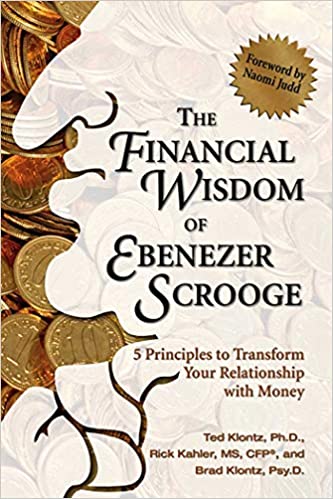
In Part One of this series, we talked about Money Scripts – how, when we are children and cannot fully understand what we are seeing in the adults around us, we pick up partial information and that often becomes our “money script,” (what we believe about money) in our adult lives.
Unfortunately, like Scrooge, sometimes our money scripts can imprison us, whether we are single or in a relationship, and those philosophies can sabotage our success in life or in our relationships.
In another Charles Dickens classic, David Copperfield, the character of Mr. Micawber explained his financial philosophy to David Copperfield:
“Annual income twenty pounds, annual expenditure nineteen ninety and six [$19.96], result happiness.
Annual income twenty pounds, annual expenditure twenty pounds ought and six {$20.06], result misery” – Charles Dickens, David Copperfield
In my previous blog on this topic, I suggested that taking the Klontz Money Script Test Inventory is a helpful tool learn your finanicial philosophy. Whether you have taken the Klontz test or not, the ideas set out in “The Financial Wisdom of Ebenezer Scrooge” will help you better understand your financial philosophy (your “money script) and provide you tools to modify or refine your financial philosophy (if you decide you would like to make those modification) to promote your success in your life and relationships or even in your divorce.
The Money Scripts from “The Financial Wisdom of Ebenezer Scrooge” are:
- “Money is bad” – “Money is evil. Rich people are bad so if I had money I would be bad, too,” for example.
- “More money will make things better” – “But, when we get ‘more money’ the ‘enough point moves farther away.”
- “I don’t deserve money.”
- “There will never be enough money.”
- “Money is unimportant.”
Cheryl Panther, Cheryl Panther, CPA/PFS, ADFA/CDFA, puts a little different spin on these categories, based on “The Financial Wisdom of Scrooge,” other books by the Klontzes and Kahler and her own years of experience in this field:
- Money Avoidance – “Money is bad. I don’t deserve money.”
- Money Worship – “More money will solve all their problems. There will never be enough money.”
- Money Status – “Net worth and personal worth are synonymous. People that are poor deserve to be.”
- Money Vigilance – “Money should be saved and not spent. Frugal, not often having a lot of credit card debt. Want to work for their money and not get handouts.”
Again, there is no right or wrong money script, but it may be helpful to your personal financial goals or to your collective financial goals, if you are in a relationship, to explore what your money scripts are, what in your past formed your money scripts and if you want to adjust or modify them to be more satisfied personally or financially.
And IF you are going through a divorce, learning this part of who you are will not only help you achieve your interests and goals in your divorce but it will likely save you money in the process because you will know WHO you are from a financial philosophy, WHO you want to be and HOW to get there. And one last thought, if you have children: remember, our childhoods are typically when our money scripts are written. What do you want YOUR children’s money scripts to be? Knowing YOUR OWN money script will best equip you for helping your children to develop their own healthy money script and financial philosophy.
As the authors of “The Financial Wisdom of Ebenezer Scrooge,” say, “Living happily ever after [even after divorce] doesn’t just happen.
It requires maintenance, planning and the support of a professional team.” If you or someone you know feels they must go through a divorce, please help them find a trained and experienced Collaborative Divorce attorney – it can make all the difference in the rest of their and their children’s future happily ever after.
Contact A Denton Collaborative Divorce Attorney
To schedule an initial consultation with an experienced North Texas collaborative divorce lawyer, contact Attorney Camille Milner at 940-383-2674.











